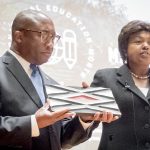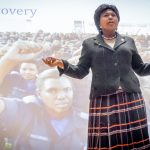nternational Education Month neared its end at the University of Indianapolis with the Oct. 27 visit of the Ambassador of the Republic of Rwanda to the United States Mathilde Mukantabana. Mukantabana met with a small group of students for questions and discussion before a public presentation detailing the events of her life and women-centered developmental projects in Rwanda.
Mukantabana worked as a tenured professor of history at Cosumnes River College in Sacramento, Cal., from 1994 to 2013. She is also the co-founder and president of Friends of Rwanda Association, a nonprofit American relief organization founded after the 1994 genocide of the Tutsi ethnic group in Rwanda, which took the lives of several members of Mukantabana’s family. During the small student discussion, Mukantabana said that part of avoiding a repetition of violence is increased education and awareness of history.
“In Rwanda, the genocide against the Tutsis is discussed pretty often. It is something that we keep in our memory—especially as part of teaching the new generations—because we truly believe to understand our history, and especially to know where we are going, is always to go back,” Mukantabana said. “Not only that, but also for the sake of commemoration. Genocide, from a historical perspective, was yesterday. It was a generation; people are still affected. Some of the choices we make as a country are still in rebuilding infrastructure, but also the people who went through that horrible period.”
Following the discussion, Mukantabana took the stage in Ruth Lilly Performance Hall to further discuss Rwanda’s recovery both economically and socially. She emphasized the role of women in the reconstruction of the nation by pointing out that women make up 64 percent of Rwanda’s parliament, which is one of the highest rates in the world.
That statistic made an impression on international relations graduate student Luanna Vitoy, who said she enjoyed Mukantabana’s description of the role women continue to play in the rebuilding of Rwanda following the genocide.
“The most interesting [part] was the political commitment to making men and women more equal,” Vitoy said. “There is a political branch that deals with gender inequality, and 64 percent of their parliament is composed of women. Representation of women is very important.”
Following the genocide, Mukantabana launched the social work program at the National University of Rwanda in 1999. She has devoted most of her professional life to domestic and international projects and conferences concerning human rights issues worldwide.
Mukantaba’s dedication to global human rights issues has resulted in her receiving numerous honors, including the 2012 Peace and Justice Award from the Center for African Peace and Conflict Resolution and the Peace and Global Peace Award by Global Majority. She is an active Board Member of the Holocaust and Genocide Studies at Sonoma State University in California. She also belongs to many local and international organizations, such as the International Association of Genocide Scholars and the Organization of African Leaders in Diaspora which she co-founded and for which she currently acts as board chair.
According to Mukantabana, rebuilding Rwandan society—or any society—is a process that necessitates unity from people of all backgrounds and genders.
“The process [of rebuilding] is not a one-way street; it is actually multidimensional, she said. “When you talk about progress in any country, it is because we are allowed to come together as people. We couldn’t have done it otherwise, because we rely much on working together correctively. So it means that if people are separate, we will never be able to achieve anything.”










